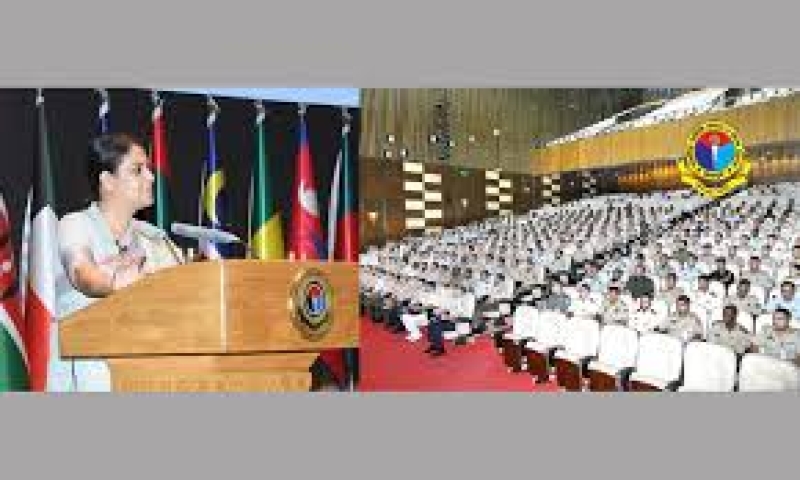- India Sees 9% Drop in Foreign Tourists as Bangladesh Visits Plunge |
- Dhaka Urges Restraint in Pakistan-Afghan War |
- Guterres Urges Action on Safe Migration Pact |
- OpenAI Raises $110B in Amazon-Led Funding |
- Puppet show enchants Children as Boi Mela comes alive on day 2 |
Climate Change Could Force BD to Redraw Its Map: Rizwana

Syeda Rizwana Hasan, Adviser on Environment, Forest and Climate Change, today warned that climate change is posing an existential threat to Bangladesh’s national security, territorial integrity, and social stability. She stressed that rising sea levels and disappearing coastlines could force the country to “redraw its map” within decades due to climate-induced displacement.
Delivering a lecture titled ‘Impact of Climate Change on National Security’ at the Defence Services Command and Staff College (DSCSC) in Dhaka, Rizwana painted a grim picture of the future. She explained that a one-meter rise in sea levels — a likely scenario by mid-century — would submerge 21 coastal districts, displacing millions and salinising rivers that are crucial to agriculture and fisheries.
"When we speak of climate change, we’re not just talking about salty water," she said. "We’re talking about the loss of sovereignty, the erosion of national territory, and the disappearance of entire communities."
Rizwana noted that 52 small island nations, including the Maldives, could disappear by 2100. For Bangladesh, the stakes are even higher: 65 percent of the population relies on freshwater fisheries for protein, which are under threat from saline intrusion.
The adviser reframed climate change as a threat multiplier, destabilizing the country by amplifying existing crises. Floods, cyclones, and droughts already cost Bangladesh 1 percent of its GDP annually, a figure expected to double by 2050. Rizwana warned that these challenges will trigger conflict over dwindling resources, with crop failures, water scarcity, and mass migration exacerbating tensions.
“Imagine one third of Bangladesh submerged under seawater,” she said. “The remaining two-thirds, already strained, will face unparalleled pressure to feed and shelter millions. Instability will become the new normal.”
She also criticized the lack of action from oil-producing nations, lamenting the failure of the Kyoto Protocol and the loopholes in the Paris Agreement. While G20 nations account for 80 percent of global greenhouse gas emissions, Bangladesh—ranked as the seventh most vulnerable nation to climate impacts—continues to bear the brunt of climate change.
Rizwana highlighted the “grim irony” of 2024 being the hottest year on record, with ocean warming and glacier melting accelerating at twice the rate of previous decades. She warned that even if all nations meet their climate pledges, temperatures will still rise by 3 to 4.5°C, far exceeding the 1.5°C threshold for survival.
She outlined Bangladesh’s National Adaptation Plan, which identifies 11 climate “stress zones” and requires US$ 230 billion by 2050 for resilience projects. However, she emphasized that funding alone won’t solve the problem. “We must redesign our development model,” Rizwana urged, advocating for a shift from fossil fuels to regional renewable energy partnerships, such as importing hydropower from Nepal.
She also called for architectural reforms, such as natural ventilation instead of air conditioning, and daylight over electric lights. At the same time, she acknowledged the challenges of enforcing environmental laws, citing corruption and understaffing. “Every time I order an enforcement raid, my team says they’ve only got six magistrates for the entire country,” she explained, urging the military’s support in regulating polluting industries.
While praising the army's rapid response to river erosion in Kurigram, Rizwana stressed the need for long-term rehabilitation strategies. She predicted that the military's role would evolve from disaster relief to managing climate refugees and securing water-sharing treaties, particularly with neighboring countries over transboundary rivers.
Her closing message was clear and urgent: “This is not about saving trees—this is about saving our nation. If we fail, future generations will inherit a country unrecognizable from today’s maps.”
The lecture was attended by Major General Chowdhury Mohammad Azizul Haque Hazary, Deputy Commandant Commodore Mustaque Ahmed, and Chief Instructor Brigadier General Mohammad Mehedi Hasan, among others.

